De Nederlandse schrijver en vertaler Rob van Essen werd op 25 juni 1963 geboren in Amstelveen. Zie ook alle tags voor Rob van Essen op dit blog.
Uit: Hier wonen ook mensen
“Walter had deze mensen zelf bij elkaar gezocht. Soms vroeg hij zich af waar ze over spraken tijdens de lange rit, of ze elkaar in de loop der tijd beter hadden leren kennen, of ze informeerden naar elkaars gezondheid, of ze bij elkaar over de vloer kwamen. Wanneer ze aan het werk waren, sprak hij nauwelijks met hen. Meestal stond hij uren voor het raam en keek toe hoe de monnik het grind harkte. Elk jaar kocht hij een nieuw busje voor ze.
Ze spraken ook nauwelijks met hem. Blijkbaar wisten ze wel wie hij was, want de Mexicaanse vrouw had ooit een poster van de Frutzles voor hem uitgerold en gevraagd of hij die wilde signeren. Hij deed dat, achteloos, alsof hij het elke dag deed. Hij vroeg zich af of ze de volgende keer met ander materiaal (bekers, t-shirts, schoolspullen) zou komen, maar ze hield het bij die poster, die blijkbaar voor gebruik in eigen kring was. In ieder geval dook er op internet nergens een aanbieding op van een door de maker zelf gesigneerde Frutzlesposter.
Veel andere mensen kwamen niet langs. Walter haalde zelf zijn post op in de dichtstbijzijnde nederzetting. Verzoeken voor interviews wimpelde hij af. De enige andere vaste gast was de Finse architect die dit huis had ontworpen en bedongen had dat hij één keer per jaar met een groepje studenten mocht langskomen. De studenten luisterden bedachtzaam knikkend naar de uitleg van de architect, namen zo nu en dan een foto en glimlachten bescheiden wanneer ze Walters blik vingen. De architect was telkens weer een jaar ouder, maar de studenten zagen er ongeacht hun herkomst elk jaar hetzelfde uit en goten hun bewondering voor het huis in exact dezelfde termen als hun voorgangers.”
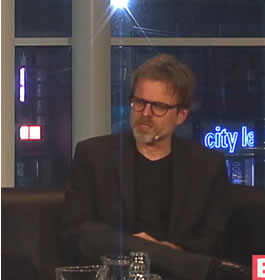
Rob van Essen (Amstelveen, 25 juni 1963)
De Canadese schrijver Yann Martel werd op 25 juni 1963 geboren in Salamanca. Zie ook alle tags voor Yann Martel op dit blog.
Uit: Life of Pi
“The doctors and nurses at the hospital in Mexico were incredibly kind to me. And the patients, too. Victims of cancer or car accidents, once they heard my story, they hobbled and wheeled over to see me, they and their families, though none of them spoke English and I spoke no Spanish. They smiled at me, shook my hand, patted me on the head, left gifts of food and clothing on my bed. They moved me to uncontrollable fits of laughing and crying.”
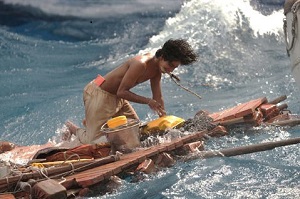
Scene uit de film “Life of Pi” uit 2012
Within a couple of days I could stand, even make two, three steps, despite nausea, dizziness and general weakness. Blood tests revealed that I was anemic, and that my level of sodium was very high and my potassium low. My body retained fluids and my legs swelled up tremendously. I looked as if I had been grafted with a pair of elephant legs. My urine was a deep, dark yellow going on to brown. After a week or so, I could walk just about normally and I could wear shoes if I didn’t lace them up. My skin healed, though I still have scars on my shoulders and back.
The first time I turned a tap on, its noisy, wasteful, superabundant gush was such a shock that I became incoherent and my legs collapsed beneath me and I fainted in the arms of a nurse.”
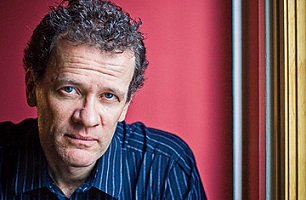
Yann Martel (Salamanca, 25 juni 1963)
De Canadese schrijver Michel Tremblay werd geboren in Quebec op 25 juni 1942. Zie ook alle tags voor Michel Tremblay op dit blog.
Uit: Crossing the Continent (Vertaald door Sheila Fischman)
“Before she gave in to her sorrow, but she couldn’t help it, she didn’t want to go away, to cross Canada or visit her two aunts and her second cousin, then lose her way in the big city, Montreal, with the mother she had stopped loving so long ago. She wanted to stop everything — the train that was picking up speed, the course of her life that was branching off in a direction she hadn’t chosen, the nightmare that was starting here, this morning, that perhaps would never end. She thought about jumping off the train, at the risk of breaking her neck, or pulling the alarm bell to stop it. Or throwing herself at the tall, moustached man, who was looking at her wide-eyed, to punch him and beg him to give her back her family. She thought about dying or, rather, that’s what death was: a definitive departure for an unknown destination. Alone. In a moving prison. With no hope of a change.
This time it’s the entire village of Maria that seems to be swalllowed up by the fields of wheat. And rye. And oats. And corn. The steeple of the church of Sainte- Maria-de-Saskatchewan floats for a moment above a square that’s greener than the rest, of wheat that’s not yet fully mature though it will soon be haying time, then it, too, will drown in the waves of grain and disappear for good. Never again will she see that either. She will talk about it all her life, she will describe the colours, the smells, the horror of bushhfires like the one last summer, the beauty of summer sunsets and the northern lights in winter over the vast plains, the tears that will come to her eyes whenever she imagines her grandmother bending over her wood stove where a pot of beef and vegetables is simmering, or her grandfather rocking on his veranda and smoking his smelly pipe, or Devil chewing diligently on a juicy red apple.”
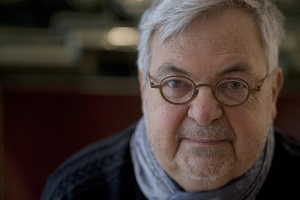
Michel Tremblay (Quebec, 25 juni 1942)
De Engelse schrijver Nicholas Mosley werd geboren op 25 juni 1923 geboren in Londen. Zie ook alle tags voor Nicholas Mosley op dit blog.
Uit:Hopeful Monsters
“My mother had gone to argue with Magda in the kitchen. Helga was banging plates down on the sideboard in the dining-room. My father had said to the girl, who was quite pretty, ‘What is your subject?’ The girl had said ‘Physics.’ My father had said ‘Then we will have a lot to talk about!’ And I wondered why my father was not talking more to me.
My father said to the young man ‘What do you do?’
The young man said ‘My subject is philosophy but at the moment I am occupied in politics.’
My father said, as he so often said ‘Ah.’
During supper my father sat at the head of the table: I sat on one side of him and the young man on the other: the girl sat next to the young man. I remember the atmosphere, the style, of this supper quite well – perhaps because it was almost the first time I had been allowed up so late; out of deference, I suppose, to the tensions of the evening. Whoever remembers the exact words of conversations? but I imagine I can recreate the style, the attitudes of my father.
He said to the girl ‘What do you know of the theories of Professor Einstein?’
The girl, who had a scraping voice that did not go with her soft squashed face, said ‘I understand they have not been verified.’
My father said ‘What do you think might count as verification?’
The girl said ‘I understand verification is unlikely.’
My father turned to the young man who had small steel pince-nez from which a black ribbon hung down. My father said ‘And what is the opinion of a philosopher or a politician on these matters?’
The young man said ‘I think these are matters for scientists and mathematicians.’
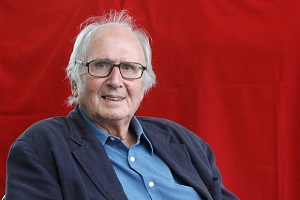
Nicholas Mosley (Londen, 25 juni 1923)
De Oostenrijkse dichteres Ingeborg Bachmann werd geboren op 25 juni 1926 in Klagenfurt. Zie ook alle tags voor Ingeborg Bachmann op dit blog.
Die Häfen waren geöffnet
Die Häfen waren geöffnet. Wir schifften uns ein,
die Segel voraus, den Traum über Bord,
Stahl an den Knien und Lachen um unsere Haare,
denn unsere Ruder trafen ins Meer, schneller als Gott.
Unsere Ruder schlugen die Schaufeln Gottes und teilten die Flut;
vorne war Tag, und hinten blieben die Nächte,
oben war unser Stern, und unten versanken die andern,
draußen verstummte der Sturm, und drinnen wuchs unsre Faust.
Erst als ein Regen entbrannte, lauschten wir wieder;
Speere stürzten herab und Engel traten hervor,
hefteten schwärzere Augen in unsere schwarzen.
Vernichtet standen wir da. Unser Wappen flog auf:
Ein Kreuz im Blut und ein größeres Schiff überm Herzen.
De havens waren geopend
De havens waren geopend. We scheepten ons in,
de zeilen voor de wind, de droom overboord,
staal aan de knieën en lachen rond onze haren,
Want onze riemen kliefden de zee, sneller dan God.
Onze riemen versloegen de spanen van God en deelden de vloed;
vóór was het dag, en achter bleven de nachten,
boven was onze ster, en onder verzonken de anderen,
buiten verstomde de storm, en binnen groeide onze vuist.
Pas toen een regen ontbrandde, luisterden we weer;
speren vielen neer en engelen traden te voorschijn,
richtten zwartere ogen op ónze zwarte ogen.
Vernietigd stonden we daar. Ons blazoen vloog omhoog;
Een kruis in het bloed en een groter schip boven het hart.
Vertaald door Paul Beers & Isolde Quadflieg
Hôtel de la Paix
Die Rosenlast stürzt lautlos von den Wänden,
und durch den Teppich scheinen Grund und Boden.
Das Lichtherz bricht der Lampe.
Dunkel. Schritte.
Der Riegel hat sich vor den Tod geschoben.
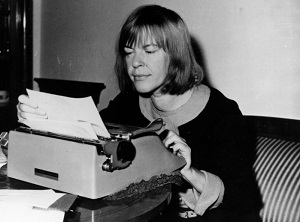
Ingeborg Bachmann (25 juni 1926 – 17 oktober 1973)
De Russische dichter en vertaler Arseny Alexandrovich Tarkovsky werd geboren op 25 juni 1907 in Elisavetgrad. Zie ook alle tags voor Arseny Tarkovsky op dit blog.
A blind man was riding an unheated train
A blind man was riding an unheated train,
From Bryansk he was traveling home with his fate.
Fate whispered to him so the whole car could hear:
And why should you care about blindness and war?
It’s good, she was saying, you’re sightless and poor.
If you were not blind, you’d never survive.
The Germans won’t kill you, you’re nothing to them.
Allow me to lift that bag on your shoulder—
The one with the holes, the empty torn one.
Let me just raise your eyelids wide open.
The blind man was traveling home with his fate,
Now thankful for blindness. Happy about it.
Vertaald door Philip Metres en Dimitri Psurtsev
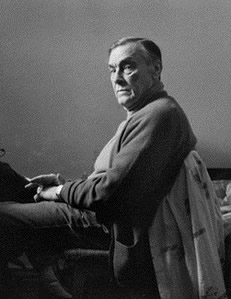
Arseny Tarkovsky (25 juni 1907 – 27 mei 1989)
De Britse schrijver George Orwell (pseudoniem van Eric Arthur Blair) werd op 25 juni 1903 geboren in Motihari, India. Zie ook alle tags voor George Orwell op dit blog.
Uit: 1984
“And this hall, with its fifty workers or thereabouts, was only one sub-section, a single cell, as it were, in the huge complexity of the Records Department. Beyond, above, below, were other swarms of workers engaged in an unimaginable multitude of jobs. There were the huge printing-shops with their sub-editors, their typography experts, and their elaborately equipped studios for the faking of photographs. There was the tele-programmes section with its engineers, its producers, and its teams of actors specially chosen for their skill in imitating voices. There were the armies of reference clerks whose job was simply to draw up lists of books and periodicals which were due for recall. There were the vast repositories where the corrected documents were stored, and the hidden furnaces where the original copies were destroyed. And somewhere or other, quite anonymous, there were the directing brains who co-ordinated the whole effort and laid down the lines of policy which made it necessary that this fragment of the past should be preserved, that one falsified, and the other rubbed out of existence.”
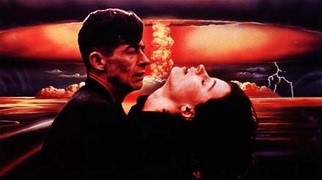
George Orwell (25 juni 1903 – 21 januari 1950)
Scene uit de film “1984” uit 1984
De Franse schrijver Claude Seignolle werd geboren op 25 juni 1917 in Périgueux. Zie ook alle tags voor Claude Seignrolle op dit blog.
Uit: Le meneur de loups
« La locature des Bâtards ne vit, dans son aspect extérieur, que par la fumée de son tas de fumier recroquevillé contre la porcherie. Une neige brillante uniformise la cour et les toits. En étanchant sa soif, le froid a changé la mare vaseuse en un bloc de glace sombre. Pris au piège, un vieux seau dort paisiblement, l’anse repliée sur ses flancs fatigués. Un long trait de glissades sur la glace apprend au passant que le fermier a des enfants jeunes et vigoureux. Face à la porcherie, faisant bande à part, sont les bâtiments plus nobles : la grange vaste et pleine d’herbe de vie, garde-manger aux effluves grisants : puis, tout contre, l’étable avec ses lents bruits de chaînes et ses meuglements sourds. Les bâtiments où logent Ribaud et sa famille dominent les dépendances et en sont séparés par une courette où la niche du chien voisine avec deux marmites ébréchées, remplies de ferrailles mariées entre elles par la rouille cupide.
Sans le souffle blanchâtre de la cheminée, l’haleine brumeuse du fumier et les geignements du bétail, on eût pu croire la ferme abandonnée.”
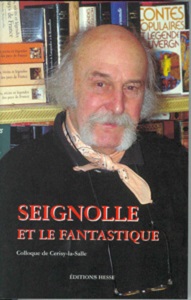
Claude Seignolle (Périgueux, 25 juni 1917)
Cover
Zie voor nog meer schrijvers van de 25e juni ook mijn twee blogs van 25 juni 2012 en ook mijn drie blogs van 25 juni 2011.
